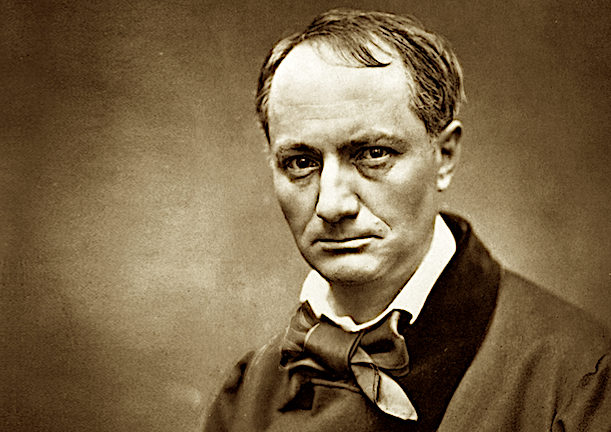
Jews have chosen to celebrate the 200th anniversary of the birth of French poet, Charles Baudelaire’s birth, by complaining about his many “antisemitic” comments while nevertheless begrudingly expressing their deep admiration for his genius as a poet:
According to researcher Brett Bowles, Charles Baudelaire, who was born 200 years ago April 9, 1821, was a raging antisemite.
In an article from 2000, Bowles noted that in “My Heart Laid Bare” (Mon cœur mis à nu), a posthumously published book of fragmentary observations, the author of the collection “The Flowers of Evil” declared: “It would be fine to organize a plot to exterminate the Jewish Race.”
The French Jewish philosopher Jacques Derrida was outraged. Derrida scorned the rationalization of Claude Pichois, an authority on Baudelaire, that somehow this passage should not be interpreted as antisemitic.
Derrida observed: “Exterminate the Jewish Race. The idea, in any case, was not so new in Europe. Nor was it the sole property of Nazi Germany.” Derrida also cited disapprovingly the German Jewish critic Walter Benjamin, who was greatly inspired by Baudelaire’s writings about art, literature and modern urban life.
Like Claude Pichois, Benjamin was inclined to give Baudelaire a pass for his extermination comment, dismissing it as merely a “prank” or “vulgar humor (gauloiserie).”
These experts were aware that Baudelaire, given to frenetic overstatements, also called for the annihilation of all Belgians, among others.
Yet biographers have pointed to the story that Baudelaire had a Jewish mistress named Sarah, nicknamed Squinty (Louchette). After their relationship broke up, he wrote some aggrieved poems and letters, mostly not intended for publication, about Jews, some of them his personal acquaintances.
The critic Mario Praz observed that the lovely squint-eyed woman is a poetic convention in Italian literature, known as la bella guercia. Yet Baudelaire’s Jewish “Squinty” may have really existed, and in his early poem “My Mistress Is Not an Illustrious Lion,” he defended her selling herself as a harlot, since as an aspiring poet, he “sells his thoughts.”
Biographers imply that Baudelaire may have borrowed money to help extricate Sarah/Squinty from prostitution. Yet after the relationship fizzled, the poet showed signs of being less tolerant toward Jews.
One target was his publisher Michel Lévy, who with his brother, Calmann, ran an influential enterprise that published most of the significant French authors of the late 1800s. Lévy’s list included Dumas, Balzac, Hugo, Sand, Flaubert, Stendhal, and Nerval.
Lévy paid authors slightly more than the going rates of the day, which did not prevent complaints from Flaubert, who scorned him as a “Yid who clings to his moolah.” (Un youtre qui ne lache pas ses piasters).
Yet the publishing historian Jean-Yves Mollier has shown that Lévy was fair with his writers, at least by the standards of his time.
Baudelaire disagreed, writing to his mother in March 1858 to describe his publisher as a “moronic (but very rich) Jew.” (un juif imbécile (mais tres riche).
Seven years later, Baudelaire penned a letter to complain to the critic Sainte-Beuve that Lévy had failed to send the former a review copy of his latest book, because “this publisher, who belongs to the race that crucified Our Lord, was naturally quite capable of economizing on the cost of a copy, to your loss.”
1867’s “Flowers of Evil” contains another poetic flashback to his relationship with Squinty, but with a new negative aura that is captured in its first line: “One night when I lay beside a frightful Jewish woman.” (Une nuit que j’étais près d’une affreuse Juive).
Instead of valuing Sarah/Squinty as in the previous poem, Baudelaire now decries her as “bought flesh.” In the same volume, another poem was eventually added, “The Seven Old Men” which describes, among grotesque street denizens of Paris, a Jewish man with a beard pointed like a sword, who hobbles along with a cane, making him akin to a “crippled quadruped or three-legged Jew.”
It has been observed that this unappealing character may be an allusion to the antisemitic legend of the Wandering Jew. This character supposedly taunted Jesus on the way to the Crucifixion and was cursed to walk the earth until the Second Coming.
Yet these references in the writings of Baudelaire did not discourage generations of Jewish readers and writers who considered him as a foundational influence for their own writing in Yiddish and Hebrew.
One such was the modernist Moyshe-Leyb Halpern (1886-1932). As the critic Julian Levinson has noted, Halpern, as an immigrant from Galicia, was a staff writer for the New York leftist daily Morgen Freiheit, which touted him as a “great working class poet.”
Following in the footsteps of the Yiddish literary historian Eliezer Greenberg, Levinson depicts Halpern as the “Yiddish Baudelaire,” in his powerfully poetic evocations of urban horrors…
Even earlier, as Ziva Shamir of Tel-Aviv University has stressed, Baudelaire’s imagery of the poet as alienated urban wanderer had impacted modern Hebrew literature.…
Later, Israeli poets from Nathan Alterman to Lea Goldberg would display Baudelairian influences….
Yet none were more marked by Baudelaire than the contemporary Hebrew poet Dory Manor, who has translated several volumes of the Frenchman’s verse in recent years.…
So overwhelming was the influence of Baudelaire on Manor that a fellow poet, Nathan Zach, slated Manor as “epigonic” (a second-rate imitator).
Yet such literary squabbles should not efface what Baudelaire’s works have represented to avant-garde Jewish creators, such as the choreographer Ida Rubinstein and Canadian poet Irving Layton.
Most movingly, in a memoir about imprisonment in Buchenwald concentration camp, the anti-Nazi leftist Jorge Semprún, describes watching the sociologist Maurice Halbwachs die of inanition.
Not knowing the words to the Kaddish, the Spaniard Semprún recited a Baudelaire poem while Halbwachs smiled bemusedly.
This use of Baudelaire as Kaddish substitute symbolizes the overpowering embrace by Jewish writers of a poet, despite the scattered negative comments he left to posterity.
As it is with many of the “great” European writers, Jews often have a love-hate relationship with them — and in the case of Baudelaire, they obviously are attracted to what they perceive to be his “Jewish” qualities — he was a cosmopolitan urban dweller, a moral degenerate, and whoremonger — and elevated this depraved life into an art form.
But then again, they must confront also Baudelaire’s run-of-the-mill “antisemitism” — which, of course, was not unique to Baudelaire, as many great French writers were “notorious” antisemites such as Voltaire and Celine.
It literally drives Jews mad when they discover writers and artists whom they greatly admire express “antisemitic” sentiments — as if the two qualities should be mutually exclusive.
But given that such famous and fondly admired writers as Shakespeare, Charles Dickens, Roald Dahl, and F. Scott Fitzgerald have all committed the “sin” of portraying Jews as less than paragons of virtue — Jews might have figured out by now that “gentiles” don’t necessarily share the same idealized view of Jews that they have of themselves.
Jews have admitted in a study that they themselves have conducted that the more educated people are, the more likely they are to hold antisemitic views — so maybe there is something to it.
Perhaps Jews should seriously consider the possibility that being an antisemite is a prerequisite to being a great writer or artist — which would explain why there have been so few great Jewish artists in general.
Instead, second-rate Jewish writers like playwright David Mamet rail against the English for not appreciating his “genius” — pathetically attempting to smear them as “inherently antisemitic.”
One has to wonder how all these great European artists ever found the time to write — given their insatiable “lust for murdering Jews,” as Jewish writer Tuvia Tenenbom put it.
Could it be that Jews are cursed to be like Mozart’s rival Antonio Salieri — who could recognize “the voice of God” in Mozart’s music but was completely incapable of creating any such music himself — leaving him bitter and self-righteous?
And perhaps that’s why the Jewish actor F. Murray Abraham was ideally suited to capture Salieri’s cursed state in the film Amadeus:
Related posts:
Views: 0
 RSS Feed
RSS Feed

















 April 20th, 2021
April 20th, 2021  Awake Goy
Awake Goy 




 Posted in
Posted in  Tags:
Tags: 
















